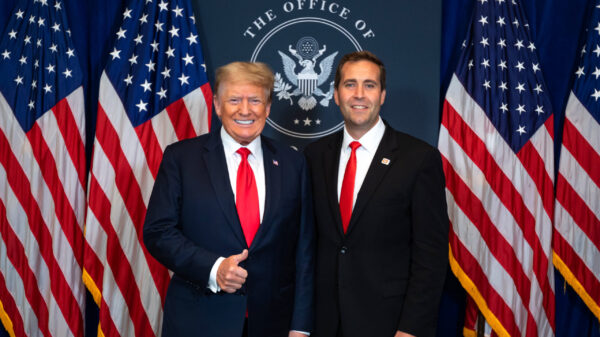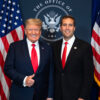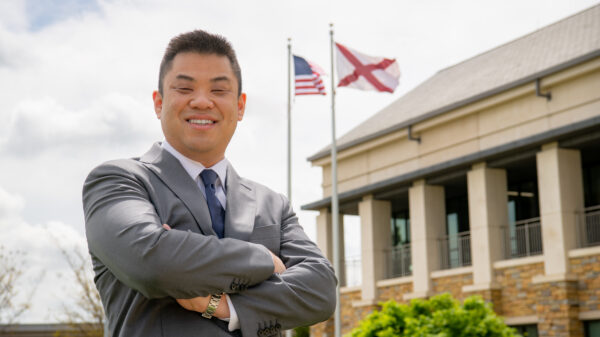Two weeks ago, on June 30, a nonprofit organization named First Principles Action Inc. plopped down the largest ever political contribution in an Alabama statewide race, giving $1 million to Katherine Robertson, who is running to be the state’s next attorney general.
First Principles Action Inc. was founded sometime after December 2024, because that’s when the entity’s larger, umbrella organization, First Principles, was initially founded. Its address is an office building in Nashville, which also houses a few law firms, a plumbing company, a moving company and Blue Cross/Blue Shield of Tennessee.
While its founder is Peter Bisbee, who previously was the executive director of the Republican Attorneys General Association, there is little other publicly available information about First Principles. There’s no tax filing to determine other board members or employees. No documents that detail where First Principles Action’s money comes from. No information at this point to see who else First Principles Action might have donated to in this election cycle.
That million-dollar donation is the darkest of dark money.
And it is perfectly legal.
“There isn’t anything that can be done about what (Robertson) has done, because it is legal and others have done the same, to a lesser degree,” said a state official, who has worked on campaign finance laws for more than two decades. The official asked not to be named in order to speak candidly about the situation.
“That said, it is obviously a way around Alabama’s laws that prioritize disclosure of donation sources,” the official continued. “If you’re making a donation in this manner, it is because you want to hide where the money is coming from. That doesn’t necessarily mean it’s being hidden for a nefarious purpose. There are many reasons someone could want to hide a donation. But the bottom line is that Alabama’s lawmakers prioritized, at the wishes of the voters, keeping the funding of our elections open and transparent, and this is a way around that.”
The pathway around it goes like this: Simply set up a 501(c)(4) organization whose stated purpose is something other than a political activity. Then, donate away.
In the world of nonprofits and politics, 501(c)(4)s are the most lenient when it comes to skirting transparency laws. They are allowed to endorse candidates (in most cases) and take up political causes. They can, without limits, support or oppose ballot measures and legislation. And they can, in some states, make donations directly to candidates. (This is all in addition to other, lesser political activity.)
Although the state has toyed numerous times since 2016 with regulating 501(c)(4) entities, Alabama has no law preventing a 501(c)(4) organization from donating to state political candidates. As such, there is nothing preventing a large corporation, or a politically motivated organization, from establishing a 501(c)(4) nonprofit with the stated goal of “educating” the public on the importance of literally anything, and then using that entity as a means to funnel money to candidates as a means of furthering those educational efforts.
Anyone could then donate to your 501(c)(4) organization, including other large corporations or organizations, and their donations instantly become untraceable, because 501(c)(4)s have no duty under the law to report the sources of funding.
Other states have stopped the practice, banning direct contributions from 501(c)(4) entities to campaigns and candidates. But Alabama is one of a handful of states that has not.
However, while it’s legal, some might still take issue with the idea of lawmakers – particularly in a race to be Alabama’s top law enforcement officer – utilizing a practice that so obviously skirts the efforts to make campaigns and donations more transparent.
To that end, APR asked Robertson’s campaign a number of questions about accepting the donation in an effort to better understand her position on the matter.
APR asked if she could disclose the original source(s) of the money behind the $1 million donation.
Robertson’s campaign answered: “We’d refer you to Peter Bisbee with First Principles to answer this question, as Katherine nor any of her campaign team are board members of the group and wouldn’t want to speculate.”
APR asked if she intended to accept the donation and whether she felt that it violated the spirit of laws established to protect transparency.
Robertson’s campaign answered: “Alabama’s Fair Campaign Practices Act doesn’t prohibit accepting contributions from 501(c)4 organizations. Numerous other candidates and elected officials have accepted similar contributions and we are proud to have the support of this organization.”
APR asked how well Robertson knew Bisbee and what their professional relationship is currently.
Robertson’s campaign responded: “Mr. Bisbee and Katherine have known each other for a while from Bisbee’s time serving as RAGA Executive Director and Katherine’s longtime service in the Attorney General’s office.”
Finally, APR noted that Robertson’s current boss, Alabama AG Steve Marshall, came dangerously close in 2018 to being hit with ethics charges (the vote was 3-2 against bringing charges) over his acceptance of funds from the Republican Attorneys General Association – where Bisbee served as director – and its political action committee. Asked if donations from a 501(c)(4) tied to Bisbee wasn’t simply another way around those pac-to-pac transfer laws, Robertson’s campaign responded:
“First Principle’s Action is not a PAC, it is a 501(c)4 organization. Again, Alabama’s FCPA doesn’t prohibit contributions from these organizations. Current and prior candidates and elected officials routinely accept contributions from similar organizations. Additionally, 501(c)4 organizations are frequently involved in elections and advocacy in Alabama. Numerous state legislative, congressional, and statewide candidates, campaigns, and elections have received support and/or contributions from similar organizations.”
APR reached out to Bisbee through email to inquire about the original source(s) of the donation to Robertson. He did not respond.
However, Robertson’s campaign did provide a quote from Bisbee explaining his organization’s support.
“First Principles is proud to support Katherine Robertson for Attorney General,” he said in the statement. “Throughout her years of public service to the state of Alabama Katherine has demonstrated her commitment to the rule of law and the Constitution. Katherine is restrained in her approach to liability issues and will continue the legacy of her predecessors in keeping the state out of frivolous litigation and ensuring a predictable legal and regulatory environment exists in Alabama.”
But Robertson’s alleged restraint aside, there could be other, more obvious reasons for Bisbee – and those who support his efforts – to back a candidate in the Alabama AG’s race.
For several years now, RAGA has essentially functioned as an arm of a far-right network influenced significantly by billionaire Leonard Leo. Leo also was the vice-president of the Federalist Society and has been credited with moving the federal judiciary, including the U.S. Supreme Court, to the right.
RAGA has benefitted significantly over the years from donations from some of Leo’s nonprofit organizations, such as the Concord Fund. In fact, for the past several years now that fund has consistently ranked as RAGA’s top donor, sending the group millions annually. In addition, as reported by numerous media outlets, RAGA routinely hosts parties in which state AGs rub elbows with some of the top supporters of Leo’s nonprofits and top donors to RAGA.
Marshall has been a major player in RAGA over the last few years, including serving as chairman of the Rule of Law Defense Fund, RAGA’s fundraising arm. RAGA has been often criticized for pushing its member AGs to enter their states into (often frivolous) lawsuits that prop up rightwing causes and also just so happen to benefit many of major donors to RAGA.
Alabama, under Marshall’s guidance, has been a prime example, entering into lawsuits with other RAGA-member state AGs that “fight the Biden administration’s…” and “challenge Obama-era…” and “fight the liberal attack on …..” Often, these lawsuits are less about sound decision making or what’s best for the states and serve only to further causes important to Leo, his groups and/or major RAGA donors.
Marshall has certainly not been alone in this regard. Republican AGs in states all across the country have taken part in the same multi-state actions, with most of the lawsuits serving as not much more than a trumped-up press release seeking to stoke public outrage over the latest rightwing cause. But there can be consequences.
Last year, Marshall and his team thumbed its nose at the federal courts and the U.S. Supreme Court in a redistricting case, believing, wrongly, and potentially because of influence from the rightwing legal community, that it was charting a pathway to the ultimate elimination of the 1965 Voting Rights Act. Instead of following the court’s directives, Marshall’s office encouraged Alabama lawmakers to resist drawing in a second majority-Black congressional district, assuring those lawmakers that the Supreme Court would rehear the challenge.
It didn’t. And now, a federal court is seriously considering placing Alabama back under pre-clearance – requiring it to have all election process changes approved by a federal court – as punishment for what it deemed blatant racism.
Additionally, Marshall’s office, like many in the RAGA world, have been near constant cash dispensaries for rightwing law firms, such a Consovoy McCarthy in D.C. Alabama has spent hundreds of thousands of dollars on legal contracts for attorneys tied to Consovoy, and other D.C.-area firms, which happen to be in the Leo orbit.
Robertson is Marshall’s choice for Alabama’s next AG and he’s made no secret of that fact, with a public endorsement. Given Bisbee’s comments and his million-dollar donation, it’s likely safe to assume that he believes Robertson will continue to operate the Alabama AG’s office in the same manner.
Regardless of Robertson’s intentions should she be elected AG, though, the million-dollar donation that landed in her campaign coffers is evidence that Alabama’s campaign finance laws are in need of a serious upgrade.














































